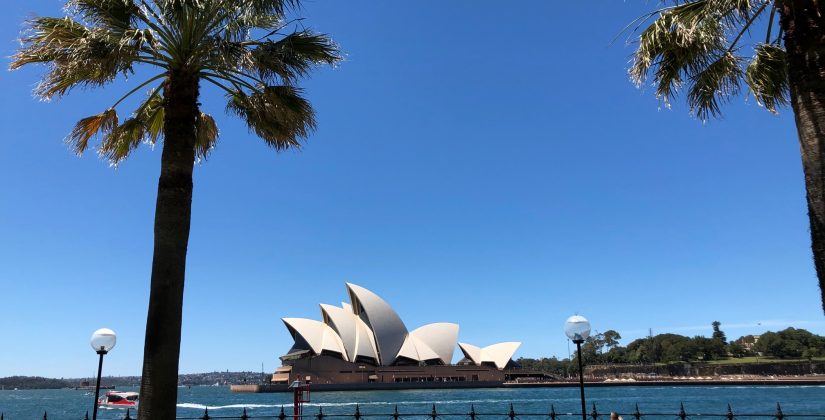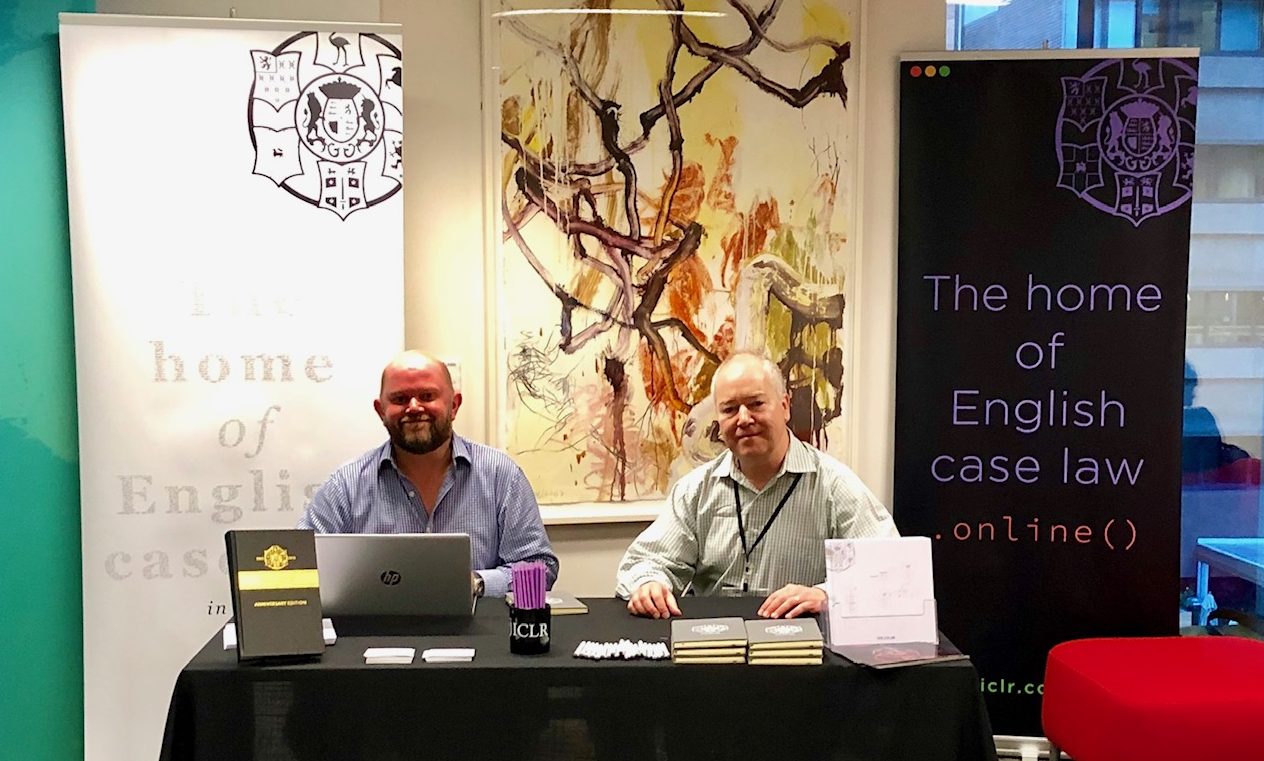Weekly Notes: legal news from ICLR, 28 October 2019
This week’s roundup comes from Sydney, where Team ICLR are attending the annual course of the International Association of Law Librarians. Because of this, we have had less time to devote to legal stories developing back home, so coverage is more brief (and a little later) than usual.… Continue reading

ICLR news
IALL in Sydney
Team ICLR was in Sydney this week for the 38th annual course of the International Association of Law Librarians (IALL). The theme of this year’s course was “Law Down Under: Australia’s Legal Landscape”. It was held at the University of New South Wales CBD campus at 1 O’Connell Street, in a building that also houses a number of top law firms, including K&L Gates.
Following a pre-conference workshop on The Australian legal system and legal research, given by Larissa Reid of the Law Courts Library and Fiona MacDowall of the Law Library of Victoria, the opening reception took place on the evening of Sunday 27 October at the Justice and Police Museum, co-hosted by ICLR as silver sponsors of the event.
The course proper kicked off next morning, 28 October, with a welcome from current IALL President Jeroen Vervliet, and a welcome to country from Aunty Norma Ingram, before the opening address by Susan Kiefel AC, Chief Justice of the High Court of Australia. She pointed out that this year was IALL’s 60th anniversary, having been founded in 1959, and that it now had over 400 members in fifty countries across five continents. This was the third time the annual course had been held in Australia. It was previously held in Sydney in 1981 and in Melbourne in 1999. It was a course and not a conference, because it involved study of the substantive law of the host country, taught by legal practitioners and academics. It helped build relationships and a network of legal research.
As a practitioner, Kiefel had come to appreciate the infinite patience of law librarians. As a barrister, she had found in the law library a haven from the pressures of litigation and the constant interruptions of the telephone. A law library was an “Aladdin’s Cave” of materials — literally, in the case of the Supreme Court Library of Queensland in Brisbane, where the librarian at the time was Aladin Rahemtula.
Kiefel CJ was followed by the Governor of New South Wales, Margaret Beazley AO QC, who spoke about Australia’s legal history and colonial legacy, including some of the earliest cases whereby the English common law was established in NSW from 1788. Over the ensuing days, the topics covered included Australian indigenous peoples and the law, Parliamentary privilege, international law, the legal regulation of technology, and refugee law affecting child migrants. Special mention should go to a very good talk on current challenges to open justice by Jason Bosland, Associate Professor of Melbourne Law School, on the Wednesday.
Between sessions, there was an opportunity for delegates to explore Sydney, with tours of the courts and their library, the two chambers of the state parliament, and an Aboriginal cultural cruise on the Mari Nawi, rounded off with a final dinner amidst the kitch diversions (sadly not open) of Luna Park. By night, the lights of the habour glittered on the water; by day the city was bathed in sunshine, with the jacaranda trees in bloom, their amethyst petals scattered by the gusty springtime winds.
Meanwhile, back in the exhibitors’ area, Team ICLR (consisting of Paul Hastings, Global Account Manager, and Paul Magrath, Head of Product Development and Online Content) could be seen awaiting the interest of delegates in ICLR products and, particularly, our new Research and Development arm, ICLR&D (on which Paul M gave a sponsor presentation on Wednesday):

Other legal news:
Crime stats
The Office of National Statistics (ONS) has published its statistical bulletin, Crime in England and Wales: year ending June 2019 (released 17 October 2019). This latest survey shows a continuing rise in fraud with the latest estimates showing a 15% increase, driven by a 17% rise in “bank and credit account fraud”. All other main crime types measured by CSEW showed no change, including lower-harm violent offences (for example, violence without injury and assault with minor injury). However, police recorded crime gives more insight into the lower-volume but higher-harm violence that the survey either does not cover or does not capture well. These data show:
- a 5% decrease in the number of homicides following a period of increases over the last four years
- a 4% increase in the number of police recorded offences involving firearms
- a 7% increase1 in the number of police recorded offences involving knives or sharp instruments.
See also: Russell Webster, Crime figures show another rise in knife crime
Grenfell Tower Inquiry report
The Phase One report of the Inquiry into the Grenfell Tower fire disaster of June 2017 was to be published on 30 October 2019. Unfortunately, or rather deliberately, information from an advance copy, embargoed until that date, was leaked to the press and there were reports in some newspapers highlighting, for example, criticism of the London Fire Brigade’s management of the disaster (though not it seems the front line fire fighters, despite assertions to the contrary). We plan to publish a separate post on the report and its implications some time soon.
Family court reporting
The President of the Family Division, Sir Andrew McFarlane, has finally published revised Guidance as to reporting in the Family Courts. This guidance has been issued, following a consultation (based on draft guidance) which began in May 2019, “to assist the court, the parties and the media in circumstances where a reporter attending court may wish to apply to vary reporting restrictions in a case before the Family Court or the Family Division of the High Court.” It was prompted in part by the hearing of the journalists’ appeal in Re R (A Child) (Reporting Restrictions) [2019] EWCA Civ 482. The President says that
“Courts should be astute to assist reporters seeking to attend a hearing, or to relax reporting restrictions, and should provide them with relevant contact details of the court office, the judge’s clerk and the parties where requested (unless there is good reason not to do so).”
The word “reporters” is defined in the guidance to include both media journalists and legal bloggers (acting under the FPR PD36J pilot scheme), in both cases needing some form of accreditation. The guidance is very welcome at a time when it is apparent, from complaints aired on Twitter and elsewhere, that some courts are resistant to the presence and activities of journalists, and some court staff have been obstructive or unhelpful.
See also:
- Transparency Project, President’s guidance as to reporting on family courts
- David Burrows, Guidance to ‘reporters’ on varying reporting restrictions orders
- Inforrm’s blog, Court Reporting: President of Family Division issues new guidance on reporting the Family Courts
- Press Gazette, Journalists should not face costs to challenge family court reporting restrictions, new guidelines say
Court reform report
The House of Commons Justice Committee has published its report on Court and Tribunal Reforms, following a consultation to which the Transparency Project and many others contributed. The committee’s inquiry addresses perceived failings and delays in HMCTS Reform, the massive £1bn+ redevelopment of court services, which has involved digitising documentation, wider use of virtual and online court processes, and the closure of many traditional court buildings. A particular concern is the question of access to justice for those less able to adapt to the digital model:
“Courts service modernisation, including use of better IT to be more efficient, is long overdue. But we have found that poor digital skills, limited access to technology and low levels of literacy and legal knowledge raise barriers against access to new services provided by digital means. The HM Courts and Tribunals Service (HMCTS) has not taken sufficient steps to address the needs of vulnerable users, who lack adequate legal advice and support. Face-to-face support is essential. We recommend that by April 2021 the network of assisted digital Online Centres be extended to deliver comprehensive national coverage with walk-in access.”
The committee’s report also highlights, among other concerns, those raised by the Transparency Project and others in relation to open justice and public legal education:
“Open justice — that is, the public resolution of criminal and civil disputes — must not fall by the wayside. HMCTS should, in consultation with the senior judiciary, develop technological solutions to support open justice. We recommend that the senior judiciary convene a working group to consider how to protect and enhance media access to proceedings. The Government should commit to piloting public legal education within its action plan for legal support, with a view to rolling out a national programme by 2022.”
Though it is more nuanced in the body of the report, this summary suffers from the same narrow view as HMCTS itself as to the need for access to proceedings: it’s not just the media (supposedly acting as the “eyes and ears of the public” who need access to monitor open justice; legal commentators and academic researchers and other groups as well as the public more generally need to have access, otherwise it isn’t truly open justice. Restrictions may be justified, eg in relation to family or other confidential proceedings, but the default position needs to be fully open to all. That seems problematic with virtual and online proceedings.
See also:
- Dominique Hogan-Doran SC, Online courts and the future of judging (from an Australian perspective)
- Transform Justice, Digital court reform: the risks of user testing
Tweet of the Week
is from Australia (since we’re here) and concerns the tricky topic of using legal words in Scrabble.
" … The debate was particularly protracted because it occurred in the context where the word estoppel had been formed on a triple word score. "
Edelman J (on joining the Federal Court)https://t.co/uqJFObm8Ni— High Court (Australia) Trivia (@HighCourtTrivia) November 1, 2019
That’s it for this week. A bit shorter than usual, but we’re on the road — still (hence the lateness of posting). Thanks for reading, and thanks for the tweets and blogs and links to content from which this post was derived.
This post was written by Paul Magrath, Head of Product Development and Online Content. It does not necessarily represent the opinions of ICLR as an organisation.
Featured images: photographs by Paul Magrath